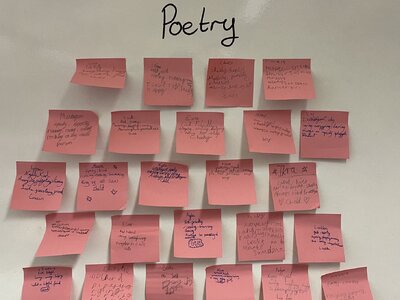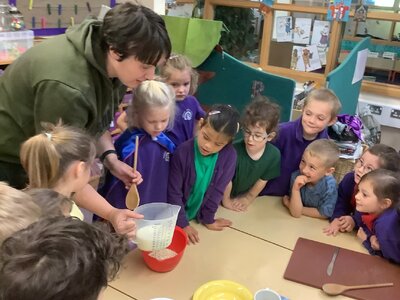Writing Curriculum Overview
- At Millbrook, we use the progression of skills and knowledge from the National Curriculum.
- Our writing is inspired by quality texts and where possible it is topic - based learning using a range of genres.
- Grammar is taught both discretely and linked to writing outcomes.
- In spelling, we teach: the common exception words; the year group specific spellings; topic specific vocabulary and Wonder Words.
- Children in Millbrook progress from printing into pre-cursive into cursive letter formation.
- By the time they leave Year 6, children will have experienced: a range of genres; will have been exposed to a wide range of vocabulary; will have been taught key spelling patterns and grammar skills.
- Within the EYFS setting, we aim for children to progress from mark making into phonetically plausible sentences. As well as discrete teaching, there are daily opportunities within enhanced and continuous provision. Squiggle While you Wiggle develops gross motor skills with children then moving onto a Funky Fingers carousel where there is a focus on fine-motor activities and handwriting.
- In Year 1, children complete a ‘Warm Write’ for each genre, which is a piece of independent writing which has been modelled by the teacher during the input.
- In Year 2, children complete a Warm Write and progress to Hot Writes, where they adapt a piece of writing in their own way and complete it with no modelling support.
- In KS2, children are ready to produce a Cold Write, producing a piece of independent writing at the beginning of a genre unit that they have previously learnt about in a different year. They continue with Warm and Hot writes.
- Real experiences are used as much as possible to motivate, engage and inspire the children to write.
- Video, music, Now Press Play, drama, scenarios, Wow starters and images are used to allow equality of opportunity for the children of Millbrook.
- Talking partners are an important aspect of our writing at Millbrook as developing speaking and listening skills prior to writing is essential for quality writing.
- Strategies we use include: pre-teach, vocabulary prompts and Working Walls.
- Purple Polishing is an embedded strategy at Millbrook. Children are encouraged to reflect upon and edit their own and each other's work.
- Handwriting is taught discretely and good letter formation is encouraged across all subjects at all times.
- In every year group from Pre-School to Year 6, our pupils learn Wonder Words. These are usually linked to the class text and/or the current Topic. This helps the children to learn and retain the meaning of more words and encourages questions and discussions around vocabulary. This has a positive effect on our pupils’ writing.
- Evidence of writing is found in English and topic books, is presented and celebrated on displays within the classroom and in shared spaces.
- Children complete Cold, Warm and Hot Writes as detailed above, showing a clear progression as they learn more about each genre.
- Children are able to write for different purposes across the curriculum.
- Teachers take photos and video evidence where appropriate.
- Quality writing is shared in assemblies.
- Focused weeks (poetry week) result in a 'gallery' where children and staff see the finished product.
- At Millbrook you will see children inspired to write.
- You will see active learners where real experiences inspire them to talk and write.
- You will see children able to write creatively and confidently with purpose across all subjects.
- You will see quality writing and a progression of skills where children can bring everything they have learnt together.


.jpg)
